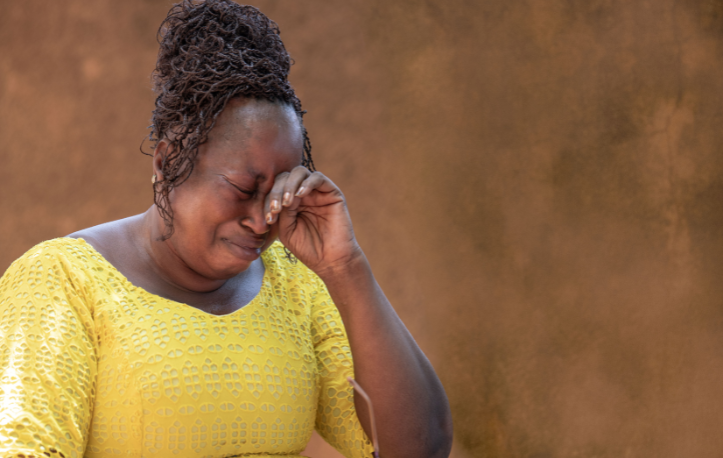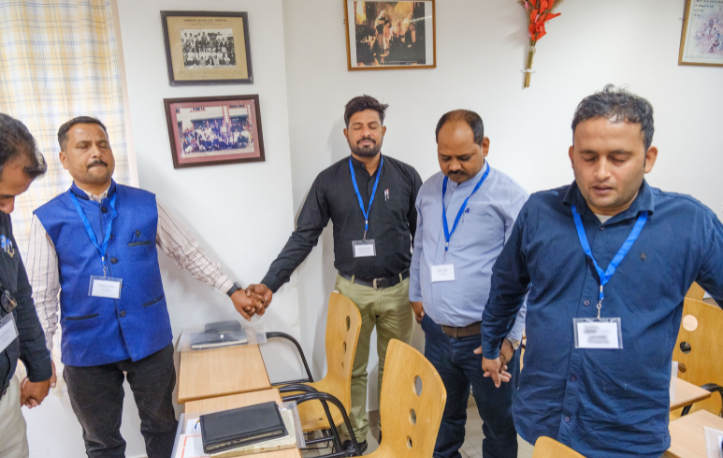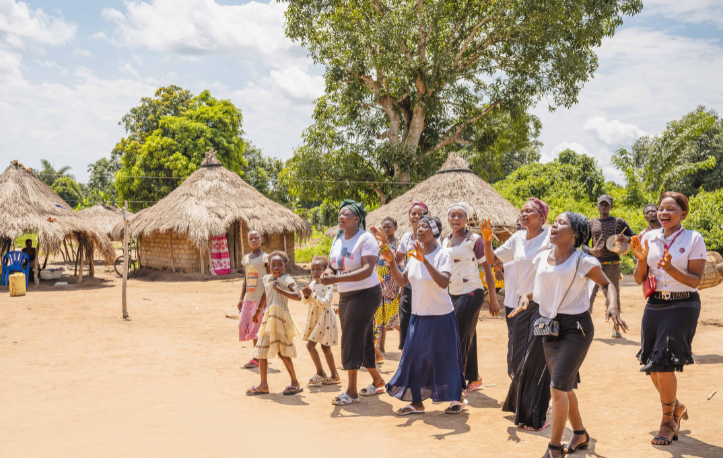Zalissa Sanou was working in the maternity ward of a small hospital in May 2021 when she heard gunfire outside.
“When we heard the shooting, we were afraid,” she said. Islamists were fighting the police and government soldiers, not far from the hospital. When the soldiers sought emergency treatment at the hospital, Islamic extremists surrounded the building.
Soon, the maternity clinic came under attack, and bullets were penetrating the walls. “Some women … were crying,” Zalissa said. “Some fell down and got hurt, and some were ready to give birth. Everybody was looking for a place to hide.”
Zalissa took shelter under a bed. But as more than 100 extremists attacked the building, she heard a terrified woman crying for help and felt she had to do something. “Lord, I am here to save life,” Zalissa prayed. “Father, cover me so that I will be able to help this woman who is delivering [her baby].”
Zalissa crawled across the room and pulled the woman close to her. Ignoring the battle raging outside, she helped the woman deliver her baby. Shock and distress, however, caused the woman to lose consciousness.
“The baby was crying, the woman was [unconscious] and I did not know what to do,” Zalissa said. Then she cried out to the Lord, “Jesus, Jesus, Jesus! Save this woman!” As she prayed, the woman regained consciousness.
The new mother and her baby survived, but not everyone in the hospital did. The battle continued for three hours, during which one of Zalissa’s colleagues was killed and her boss was taken hostage. When government forces eventually cleared a path allowing hospital staff to escape, Zalissa and several colleagues fled on foot.
As she ran from the fighting, Zalissa saw bodies lying in the streets, and many had been mutilated. She and another woman ran for about 15km, until they reached a small town, but Islamist fighters were there waiting. One of the extremists sexually assaulted Zalissa, and a pregnant colleague miscarried as a result of the stress and anxiety.
After the Islamists released Zalissa, she travelled to Burkina Faso’s capital, Ouagadougou, where she was physically safe but not emotionally well.
“I was heartbroken,” she said. “It was very difficult for me — very, very difficult.” Once her physical injuries had healed, she continued to struggle mentally and emotionally. She had seen decapitated bodies, a horrifying memory that remains with her.
She had kept secret — even from her husband — the sexual assault. The painful, secret memories began to cause nightmares in which she relived the assault and abuse. Her relationship with her husband was also deeply affected, and she was afraid to return to work.
A pastor who knew of Zalissa’s situation invited her to meet with some other women to learn how God can heal inner wounds. First, the women were encouraged to write everything they had suffered on a piece of paper. “Then you go out and carry them to Jesus,” Zalissa said, describing how she symbolically laid her suffering at the foot of a cross. “It was on that day that I started getting better.”
Sharing her story with other women who had been sexually assaulted brought a measure of healing, but Zalissa still couldn’t imagine why God had allowed her to be abused. “When this thing happened,” she said, “I told God that He had forsaken me.”
Her perspective changed, however, when she joined other Christians to study what the Bible says about suffering and forgiveness. “I realised that I shouldn’t say that God has forsaken me,” Zalissa said, “because … I saw His hand on me when I was going through hard times.”
A Nation Under Siege
Islamist groups from neighbouring Mali and Niger have invaded Burkina Faso, taking control of roughly a third of the country’s territory and driving more than two million Burkinabe from their homes. While the Islamists have killed indiscriminately in the majority-Muslim nation, they usually target Christians first.
In recent years, the Islamists have displaced hundreds of pastors and killed many Christians. In August 2024, Islamic extremists killed 26 Christian men in the village of Kounla after binding their hands and forcing them into a church.
“Christians have likely suffered greater emotional turmoil than the general [Burkinabe] population,” a front-line worker said, “as jihadis frequently target churches when they enter a village … exemplified in [Kounla]. For this reason, the need to provide emotional care in areas such as Kounla becomes more pressing because the health of the future church in Burkina Faso may depend upon counselling interventions performed during the aftermath of such attacks.”
The effect of the murders, displacements and assaults is so widespread that pastors struggle to care for all the Christians suffering from mental and emotional wounds. “We [have] lost many, many people,” said Boubakar Ouedraogo, a pastor and senior church leader in Ouagadougou. “Many … churches are closed.”
But Boubakar is working to help heal the brokenhearted men and women in his country, including those who may resist help with their emotional wounds. “In our culture and in many cultures, they say men should not cry, should not grieve,” he said.
“We let them know that even Jesus grieved after the death of Lazarus. It is normal for a man to weep.”
Boubakar meets regularly with other pastors to identify Christians who are suffering from emotional trauma. Then they invite those people to a week of teaching designed to help them understand suffering in a biblical context and begin to experience
God’s healing. Afterwards, the participants receive a copy of the teaching on an audio player and are encouraged to share what they have learned with others who may need help.
“Trauma disconnects the person from God, from his environment and from himself,” the pastor said. “When you are traumatised, you are not your normal self. You change identity.” Boubakar is working to help people reconnect with others and with the God who loves and cares about them.
Comforted to Comfort Others
Yacouba Odineneka, a government worker, has survived multiple Islamist attacks. It had never occurred to him that he might be suffering from trauma, but after the attacks, he noticed that both he and his wife were acting strangely.
“After the terrorist attacks, I realised that I was changed,” he said. “I became nervous. Sometimes I could be sitting alone and talking to myself.” Yacouba stayed mostly indoors, and he struggled to sleep at night. Meanwhile, his wife suffered from constant headaches, anger and lack of appetite. “She was shouting, and [I thought] my wife had changed,” Yacouba said. “She had become aggressive; before she was not like that.”
During one attack, Islamists murdered an elder at Yacouba’s church and abducted his pastor. They held the pastor hostage for several days before finally killing him. Yacouba found his body, along with those of several others who had been killed, and buried them.
During another attack, Islamists killed more than 100 people not far from where Yacouba and his family live. Later, he and two of his children were held hostage in their own home by two young extremists. Yacouba thought they were going to kill him and his children, but the Islamists eventually left, presumably annoyed by the screaming of Yacouba’s infant child.
Like Zalissa, Yacouba was invited to hear how God can heal inner wounds. As he listened to the teaching of local pastors, he realised that both he and his wife were suffering from trauma. He recalls one specific teaching that helped him see the depth of his problem.
“For me, it was the lesson on forgiveness,” he said. “Because of what I went through, it was very difficult for me to forgive.”
As Yacouba studied biblical forgiveness, he came to realise that God’s forgiveness of his sins must lead to his own forgiveness of others. “I was able to forgive some people and to let some things go out of my heart,” he said.
Before forgiving the Islamist attackers, however, he had to forgive his own mother. Yacouba was raised in a Muslim home, and his mother had rejected him when he became a follower of Christ. Over time, he forgave his mother, and in the process, she placed her faith in Christ.
When Yacouba told his wife what he had learned from the pastors, she too, gained a new level of peace. Yacouba then shared what he had learned with others, including a doctor who was suffering mental and emotional distress from treating so many attack victims. Through their discussions, the doctor’s mental health improved, and he regained the strength to continue providing medical care.
Yacouba and Zalissa each risked their lives to share their stories. Zalissa rode 13 hours on top of a truck to reach Ouagadougou, and Yacouba left the embattled area where he lives on a military plane that flew over territory controlled by the Islamists. He didn’t know how he would be able to return home safely.
Zalissa said the woman and baby she helped during the hospital battle are doing well. And since suffering the sexual assault, Zalissa has helped four other women who were sexually assaulted. When they thank her for helping them, she points them to God.
“I tell them to thank God,” Zalissa said, “because it is God who allowed me to go through this. [The teaching on biblical forgiveness] is very, very, very important. It helps us to get free, to get healed.”
Yacouba requests prayer as he seeks to comfort more people with the comfort he has received. “I want people to pray for me so that … I will be able to use [the lessons I learned] to help many people,” he said. “There are many people now who are traumatised, but they don’t know that they are traumatised. May God give me more compassion, more strength to help all these people.”



Submit a Prayer